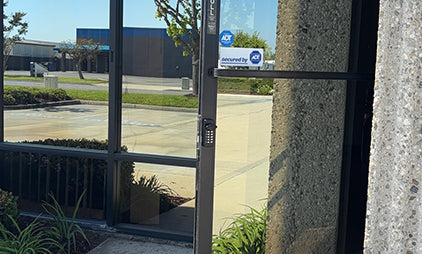
Mechanical vs. Electronic Storefront Locks: Which Is the Better Choice for Your Business?
Share
Selecting the right lock for a storefront door has long-term impact on daily operations, staff management, and overall security. While electronic smart locks have become more visible in recent years, mechanical keypad locks remain widely used in commercial environments for their stability and simplicity. For business owners, the real question is not which technology is newer, but which solution delivers the most reliable and cost-effective protection.
This article compares mechanical and electronic storefront locks from a business-focused perspective—security, maintenance, usability, and cost—to help you decide which approach best fits your store.
Security and Reliability
Electronic locks offer features such as app control and remote access, but they also introduce points of failure. They depend on power, batteries, or network connections, any of which can disrupt lock operation. When Wi-Fi drops, software glitches, or batteries die, access can be slowed or completely blocked.
Mechanical keypad locks, by contrast, operate without power. Their internal mechanisms deliver consistent performance even with heavy traffic or harsh weather. For a storefront that opens early, closes late, and faces outdoor exposure, mechanical reliability is often more valuable than high-tech features. In terms of consistent access and failure-proof security, mechanical locks hold a clear advantage.
Maintenance and Long-Term Cost
Electronic locks typically require higher and ongoing maintenance. Common tasks include updating firmware, replacing batteries, maintaining network devices, or paying subscription fees for remote functions. As time passes, these hidden costs accumulate and may exceed the price of the lock itself.
Mechanical keypad locks have virtually no recurring cost. There are no electronics to service, no software updates, and no consumable parts like batteries. Once installed, a mechanical lock can operate for many years with minimal attention. For cost-conscious business owners, especially small storefronts, mechanical systems provide more predictable long-term value.
Access Management and Staff Control
Electronic locks offer multi-user databases and remote management, which may be beneficial in large organizations. However, many storefronts do not need such complexity. Most small businesses require only a controlled entry method for current staff, and a quick way to remove access for former employees.
Mechanical keypad locks solve this cleanly by allowing owners to use and update an access code. When staffing changes, the code changes—no re-keying, no app permissions, no administrative burden. For businesses with frequent employee turnover, the simplicity of mechanical access control is a major operational advantage.
Installation and Compatibility with Storefront Doors
Electronic lock installation often requires wiring, drilling, or door modification, especially when added to glass-and-aluminum commercial doors. This increases cost and can void door warranties if performed incorrectly.
Mechanical keypad locks—especially models designed as Adams Rite replacements—can be installed directly into existing mortise setups. They are a clean upgrade path for commercial storefront doors, with fast installation and no structural change. For landlords, property managers, and multi-location retailers, this compatibility reduces downtime and maintains professional door aesthetics.
User Experience for Daily Operations
Electronic systems can create friction in real-world use. Employees may need a phone app, Bluetooth pairing, or a strong Wi-Fi signal to unlock the door. During busy hours, network delays become operational delays.
Mechanical keypad locks offer a faster and more predictable experience. Staff enter a code, turn the handle, and walk in. There is no learning curve, no mobile dependency, and no variation in performance. For customer-facing businesses, convenience and speed are critical, and mechanical systems excel at both.
Conclusion
Both lock types have their place, but for typical storefront environments, mechanical keypad locks deliver greater reliability, lower maintenance, easier access control, and better long-term value. Electronic locks appeal to those seeking advanced digital features, while mechanical locks prioritize durability and fail-proof security. For many businesses, especially retail and service locations, a mechanical keypad lock is the smarter and more resilient choice.
FAQ
Are electronic locks suitable for storefronts?
They can be, but they require stable power and network conditions. Without those, reliability may suffer.
Why do businesses still use mechanical keypad locks?
Because they provide consistent access, resist failure, require no electronics, and are easy to manage.
Do mechanical keypad locks support Adams Rite doors?
Yes. Many are specifically designed for Adams Rite replacement and can be installed with no drilling or modification.

